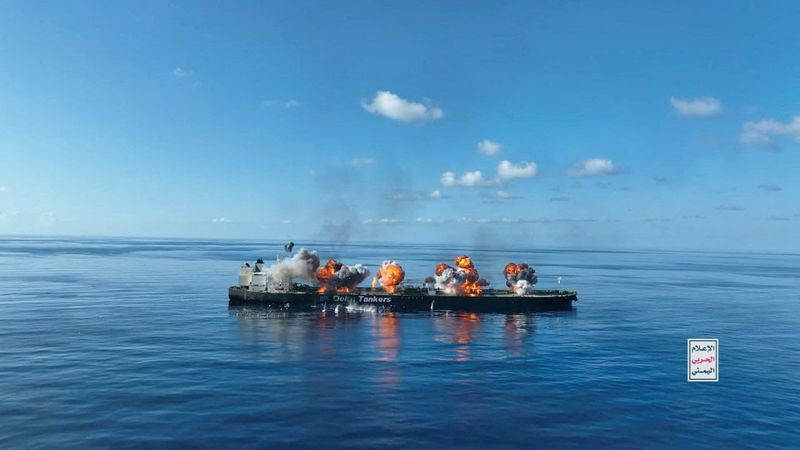
LONDON/ATHENS (Reuters) – Private companies involved in salvaging the Sounion tanker, which was attacked by Yemen’s Houthis in the Red Sea, are exploring other options after the towing operation was deemed unsafe, the European Union’s naval mission said on Tuesday.
The Sounion, which was struck on Aug. 21 and which the Houthis and maritime sources have said has been rigged with explosives, is laden with about one million barrels of crude oil and still on fire.
The EU’s naval force Aspides has said it will provide protection to tugboats that will deal with the salvage operation.
“The private companies responsible for the salvage operation have concluded that the conditions were not met to conduct the towing operation and that it was not safe to proceed,” Aspides said in a post on X on Tuesday.
“Alternative solutions are now being explored by the private companies.”
If a spill occurs, it has the potential to be among the largest from a ship in recorded history and could cause an environmental catastrophe in an area that is particularly dangerous to enter.
“The operation is continuing and continued assessments are required. This will take some time,” a source familiar with the matter told Reuters, adding that conditions were complex.
The Iran-aligned Houthi militants have said they would allow salvage teams to tow the ship to safety. The ship’s crew has been evacuated.
The vessel’s Greece-based operator Delta Tankers declined further comment, pointing to the statement from Aspides.

Three other sources familiar with the matter added that a reassessment of the plan was necessary as there were high risks with the salvage, which one described as a “surgical operation”. Another said the risks were initially underestimated and more technical resources and staff were required.
The Houthis first launched aerial drone and missile strikes on the waterway in November. They say they are acting in solidarity with Palestinians under assault in Israel’s war on Gaza. In more than 70 attacks, the Houthis have sunk two vessels, seized another and killed at least three seafarers.
This post is originally published on INVESTING.


